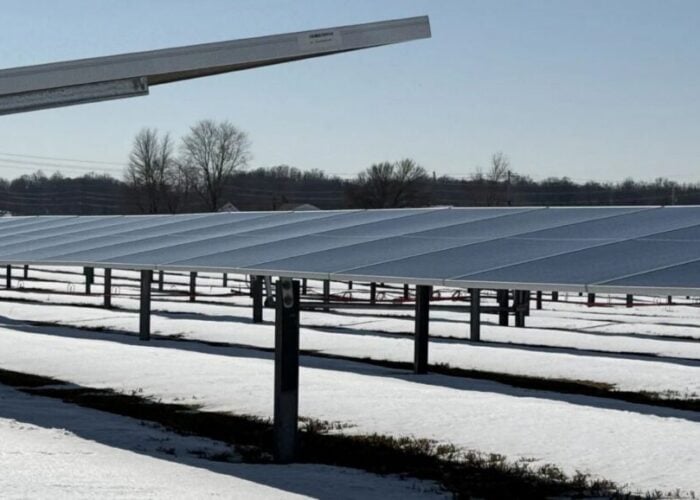Recognising that the vast growth in solar deployment under the feed-in tariff (FiT) could lead to an accumulation of PV waste in landfills, Japan will soon begin implementing recycling rules for solar modules.
Solar panels installed since the beginning of the feed-in tariff (FiT) policy was introduced in Japan in 2012 will start approaching the end of their expected lifespan by 2040, with PV panels expected to last around 25 years in the field.
Try Premium for just $1
- Full premium access for the first month at only $1
- Converts to an annual rate after 30 days unless cancelled
- Cancel anytime during the trial period
Premium Benefits
- Expert industry analysis and interviews
- Digital access to PV Tech Power journal
- Exclusive event discounts
Or get the full Premium subscription right away
Or continue reading this article for free
A working group convened by the country’s Environment Ministry calculated that landfills sites could be filled with close to 800,000 tonnes of PV modules by 2040, building up from expected near-future levels of about 3,000 tonnes by 2020 and 30,000 tonnes by 2030. In addition to solar PV panels, the study looked at wind power technologies and solar heating equipment.
The ministry said that, in conjunction with the Ministry of Trade, Economy and Industry (METI) and industry organisations, it will begin to implement measures for “removal, transportation and processing of solar power generation equipment” before the end of this fiscal year, March 2016.
The study group highlighted that the cost of removing PV from landfill could outweigh the economic benefits of the energy resources obtained during the panels’ lifetimes. However, it said, an efficient recycling system could reverse this situation.
Materials used in PV panel production include copper and silver. These can be separated from the glass – which currently comprises around 70% of the weight of a typical PV panel – by smelting. The value of the recovered metals can vary greatly, the group wrote. Of more concern is the lead and selenium content more commonly used in thin-film solar, which are both hazardous materials. The group said that to some extent, domestic manufacturers in particular could be encouraged to find more environmentally friendly manufacturing processes using less lead, for example.
The Environment Ministry’s working group referred to measures being introduced internationally by point of comparison. At present, Japanese firms are required to treat used or damaged panels as industrial waste and are not compelled to account for more than a small amount of the panel’s waste (about 5%).
The EU has introduced the so-called WEEE directive for recycling since 2014, which compels manufacturers to account for their stock. One company, PC Cycle, has been providing recycling and consultation services since 2007 in Europe. It was set up as a voluntary initiative by a group of companies in the solar industry and includes staff from Trina Solar, CSun and developer Conergy among its board of directors. PV Cycle says it has already recycled 12,000 tonnes of PV module waste to date.
PV Cycle this morning told PV Tech that while it only operates its recycling schemes in Europe at present it has consulted with international associations, authorities and researchers on setting up similar schemes elsewhere, including Japan.
“While we do not operate a collection and recycling infrastructure outside of Europe today, we do consult PV companies on their waste matters on an international scale. We have registered an increasing awareness for sustainable waste management in other regions in the world in the last two years,” the company said in a statement this morning.
“With the increasing environmental awareness of customers all around the world, taking an active stake in international lifecycle management can make the difference for PV companies to succeed or not succeed in the long term.”
Elsewhere, the Japanese Environment Ministry working group pointed out, US thin-film manufacturer and utility-scale project developer First Solar has also begun its own recycling and recovery programme.
Energy transparency
Transparency over energy-related environmental issues has become a key issue in Japan following the response to the nuclear disaster at Fukushima, which led to radioactive materials leaking into the sea and saw the Japanese public kept waiting to find out news from the tsunami-struck reactor. Many sources in Japan have expressed their anger at the way the crisis was handled.
Additionally, last week, the chair of the executive board of the Japan Renewable Energy Foundation (JREF), Thomas Kaberger, wrote in a column for the organisation’s website that electric power companies in Japan do not operate with a satisfactory level of transparency. Kaberger wrote that electric power companies, which sell power as utilities as well as being responsible for transmission and distribution (T&D) networks, hold on to all their own data regarding the local grids and energy mixes.
Last year’s dispute over available grid connection for renewable energy projects, therefore, could only be examined using data provided to the government by the power companies themselves.
“By controlling the information they can manipulate decision makers, against the interest of Japan and the customers – in favour only of themselves,” Kaberger wrote.
Kaberger called for the ownership and control of the grid to be separated from the ownership of power plants, to open up competition. Japan is expected to begin a process of deregulation of its electricity markets next year.
Volume 3 of PV Tech Power, the downstream technical journal for the international solar industry, features an in depth look at the recycling of PV waste. Subscription to the journal is free.






